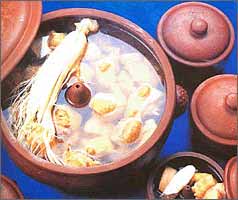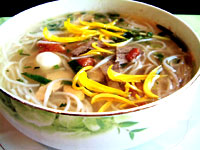CONTACT US
| +86-10-82600771 | |
| WhatsApp: +86-13911460247 | |
| Messenger: chinatournet | |
WeChat ID: callchinatour | |
Book Kunming Hotels | Dali Hotels | Lijiang Hotels
Capital City: Kunming
Population: 43.7
million
Area: 394,000 sq km
Yunnan Province is without
doubt one of the most alluring destinations in China.It's the most varid of all
of China's provinces,with terrain ranging from tropical rainforest to
snow-capped Tibetan peaks.It's also the sixth-largest province and home to
a third of all China's ethnic minorities(nearly 50% of the province is non-Han)
and half of all China's plant and animal species. There are 25 different ethnic
minorities in Yunnan, making it the most culturally diverse province in China.
This multiplicity of cultures has endowed the province with a rich heritage that
it shares with all who come to visit. There is always something wonderful to see
and do here.
The natural beauty of Yunnan Province defies description. It has mountain ranges and glaciers that are snow-capped all year round, deep virgin forests, lakes and hot springs, alpine landscapes, precipitous valleys, beautiful farmlands, mountain rivers and valley streams, floral splendor that blooms throughout the year, and vast skies with amazing clouds.
Yunnan is also well known for its mild climate year-round-its name
means'South of the Clouds'.The provincial
capital,Kunming,is similarly
refered to as the 'Spring City'.Thus,if you could only go to one province,this
might well be it.
Until recent times most of Yunnan was not easily reachable as it was cut off from communication with the outside world by precipitous mountains. Many believe that the Shangri-la referred to in James Milton's Lost Horizons, was here in Yunnan. It now may be the last virgin land where one can observe cultures whose layers go back for thousands of years into the past. Visit Yunnan and be prepared to be enchanted. She welcomes you!
---Main Atrraction
|
|
|
| |
|
|
|
| |
|
|
|
| |
|
|
|
|
---History
Yunnan Province is one of mankind's birthplaces. As early as 1.7 million
years ago Yuanmo Man, known for his use of stone implements, lived in the
region. By the time of the Shang and Zhou dynaisties, the Warring States and the
West Han Dynasty, the region was known for its great progress in agricultural
production and for the high quality of its bronze wars.
During the period
300-280 BCE, Marshal Zhuang Qiao of Chu State invated Yunnan Province. With his
troops, he also brought advanced agricultural production techniques to the area.
A century or so later, during the Qin Dynasty (221-207 BCE), a narrow road was
built linking Yunnan Province closely with inland areas. In the period of the
West and East Han dynasties, the central government set up local administrative
offices. This strengthened the provinces contact with the Central Plains as far
as politics, economy and culture were concerned. The close relationship was
further strengthened during the Tang and Song dynasties. Important historical
events - such as the uprising of the Nanzhao STate, the prosperity of Dali
State, the conclusion of the Ming Dynasty and the Revolution of 1911 - all
brought about profound changes in the region.
Perhaps Yunnan Province
is best known to outsiders as being part of the "South China Silk Road."
Existing hundreds of years earlier than the North China Silk Road, the South
road through the rugged and rough terrain of the Yunnan linked the province to
the Indian-Pakistan subcontinent and the outside world.
---Culture
Yunnan Province has a unique culture consisting of splendid cultural
heritage of multiple nationalities. Since ancient times, people in the region
have engraved painting on precipices and on bronze wares. They depicted their
rich feelings and beliefs through characters and paintings.
"Dongba" (the
highly educated man) culture of Naxi Nationality and its "Dongba Scripture," the
earliest hieroglyph existing in the world, are indications that the plateau had
once been cut off from the outside world. The culture of Dai Nationality is
symbolized by its unique "Beiye Scripture," Buddhist temples of different sizes,
the Jingzhen Octagon Pavilion, and the Manfeilong White Temple. Every
nationality has its unique way of cultural expression, such as the New Year Song
Festival of the Tibetan Nationality, Munao Mass Song and Dance Festival of
Jingbo, the Three-Pagoda Building in Dali and the Golden Palace built mainly out
of copper.
Holiday celebrations, religions, rites, weddings, burials, and
people's daily lives have all been imbued with the strong cultural colour of
different nationalities. Inspired by these activities, people have created a
variety of arts characteristic of their national background, including
construction, engraving, knitting, wax printing, embroidery, song and dance,
paintings, poems and legends.
---People
The population of Yunnan is approximately 34 million. There are 24 registered minorities, including the Zhuang, Hui, Yi, Miao, Tibetans, Mongols, Yao, Bai, Hani, Dai, Lisu, Lahu, Wa, Naxi, Jingpo, Bulang, Pumi, Nu, Achang, Benglong, Jinuo, and Dulong.
The Naxi, living in and around the town of Lijiang in the northwestern part of Yunnan, bordering Tibet, are noted as one of the few Asian people who have maintained a matriarchal society (anthropologists believe that most early human societies have in fact been matriarchal, meaning to say, dominated by women). Apart from northwestern Yunnan, matriarchal societies are, for example, still found today in central Sumatra.

Ethnically, the Naxi belong to the Tibetan group. However, the region where they live, or roamed (as they used to be nomads), administratively belongs to the Chinese provinces of Yunnan and Sichuan. They count some 280,000.
---Food
Yunnan Cuisine, though not yet well known in the West, is one of
the best regional eating experiences in China. Many dishes borrow hot, spicy
flavours from neighbouring Sichuan. Others, influenced by periodic migrations
provinces such as Jiangsu,Zhejiang and Guangdong, reflect the subtle, rounded
taste of eastern and southeast Chinese cuisine. The Year round availability and
variety of vegetables provides a seemingly limitless menu.
Xuanwei huotui 
A strong, tasty, country-cured ham. Unlike in the rest of
China,the Yunnanese appreciate certain dairy products. An excellent mild white
cheese (rubing) is eaten fried or steamed in combination with ham or vegetables
especially the tender, emerald-green horse beans (candou). In spring ans summer
eels, caught in the wet rice fields, are great delicacy.
Mushrooms
Appear in great profusion when the rains let up in August . The
most highly prized of the dozens of varieties are "chicken-tast
mushroom"(jizong)and morel, called " Sheep-stomach mushroom " (yangduzi) . For
vegetable lovers , Yunnan is a joy, Lotus root, bamboo shoots, tender young
pea-sprouts, Chinese broccoli, beans of many types, green garlic
shoots.
Steam Pot Chicken ( Qiguoji) 
Yunnanese is the ceramic steam pot, a squat, round, lidded
vessel with an internal spout, or chimmney, that allows steam to enter and
circulate but not escape. Chicken cooked by this technique produces a superior
soup entirely from steam and natural juices. This dish, called steam Pot Chicken
(qiguoji) comes first on the list of Yunnan‘s specialities. A remarkable
feature, which should not put anybody off, is the inclusion of natural medicinal
ingredients used by the Chinese both to enhance flavour and to promote health.
These might include ginseng, herbs or dried Himalayan caterpillars.
Crossing - Bridge Rice Noodles (Guoqiao mixian)
Most famous flavour dishes in the province, came from a story in the southern
Yunnan. A scholar, preparing for the imperial examinations. isolated himself on
an island in a lake. His devoted wife was dismayed that meals she carried to him
across a long, wooden bridge always arrived cold. But by chance, she discovered
the way to keep soup boiling hot was to top it with a thin layer of vegetable
oil which prevented the spot without a stove. Of course, her husband passed the